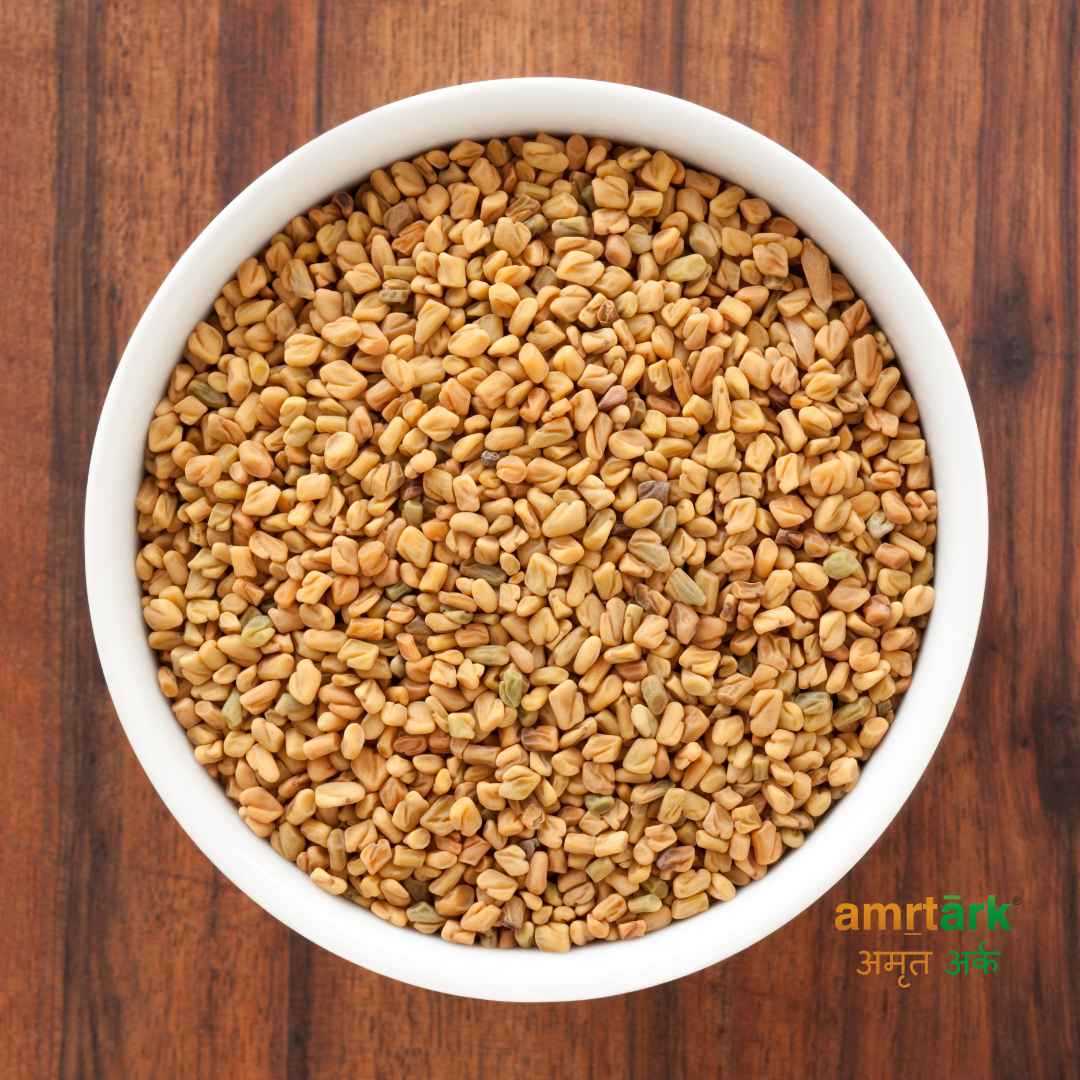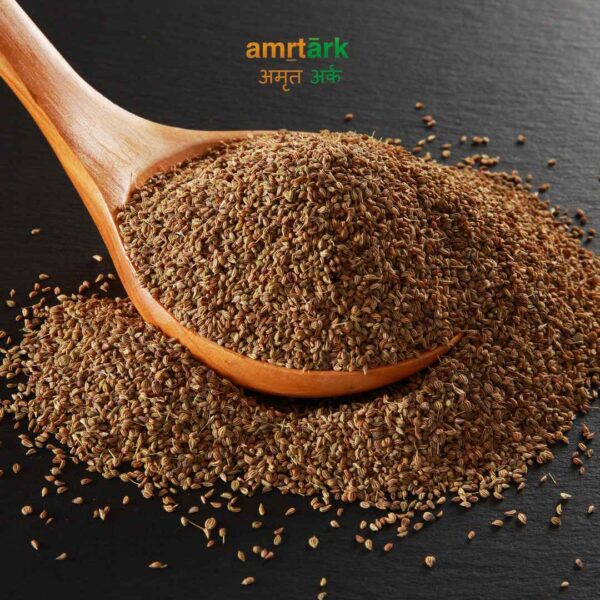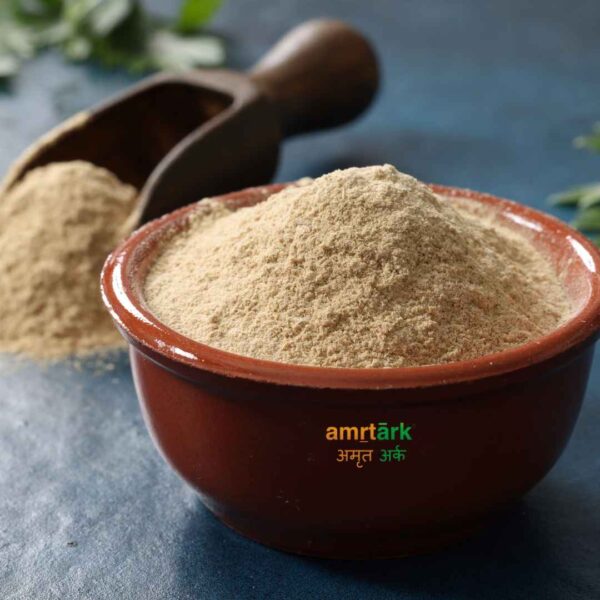Description
Fenugreek (Trigonella foenum-graecum) – Methi
Fenugreek, scientifically known as Trigonella foenum-graecum, is a highly valued herb and spice, known commonly as Methi in India. It has been used for centuries in traditional medicine, especially in Ayurveda and Unani systems, as well as in cooking for its unique flavor and health benefits. Fenugreek seeds, leaves, and even roots are utilized for their therapeutic properties, ranging from improving digestion to regulating blood sugar levels.
Botanical Characteristics
- Common Names: Fenugreek, Methi, Greek Hay, Bird’s Foot, Chandrika
- Scientific Name: Trigonella foenum-graecum
- Family: Fabaceae
- Appearance: Fenugreek is an annual plant that grows about 2 to 3 feet tall, with light green, oblong leaves and small, yellowish-white flowers. The seeds, which are the most commonly used part, are small, yellow-brown, and have a strong, distinctive, slightly bitter flavor.
Active Compounds and Nutrients
Fenugreek contains several bioactive compounds that make it a powerful natural remedy:
- Saponins: Known for their ability to lower cholesterol and improve cardiovascular health.
- Alkaloids: Such as trigonelline, which have hypoglycemic effects and help regulate blood sugar.
- Flavonoids: Provide antioxidant properties that help fight inflammation and oxidative stress.
- Soluble Fiber: Helps improve digestion and supports healthy bowel movements.
- Mucilage: Has soothing properties, especially for the digestive tract.
- Iron, Magnesium, and Vitamins A, B6, C, and K: Fenugreek is rich in essential nutrients that support overall health and well-being.
Health Benefits of Fenugreek (Methi)
- Regulates Blood Sugar Levels: One of the most well-known benefits of Fenugreek is its ability to regulate blood sugar levels. It contains soluble fiber and compounds like trigonelline and galactomannan, which slow down the absorption of carbohydrates and sugar, helping to control blood glucose levels. This makes Fenugreek an effective natural remedy for managing diabetes, particularly type 2 diabetes.
- Boosts Digestive Health: Fenugreek seeds are rich in fiber and mucilage, which help soothe the gastrointestinal tract, reduce inflammation, and promote healthy digestion. It is commonly used to treat indigestion, constipation, and other digestive disorders. The seeds also stimulate bile production, which helps in the digestion of fats.
- Improves Lactation in Nursing Mothers: Fenugreek is a well-known galactagogue, which means it stimulates milk production in breastfeeding mothers. This is due to the presence of phytoestrogens, which mimic the effects of estrogen in the body, increasing milk supply. It is often recommended to nursing mothers who experience low milk production.
- Enhances Male Libido and Testosterone Levels: Fenugreek has been shown to boost testosterone levels and improve sexual function in men. Its saponins, particularly diosgenin, play a role in supporting hormonal balance. This makes Fenugreek beneficial for enhancing libido, improving fertility, and increasing stamina in men.
- Lowers Cholesterol and Supports Heart Health: The high content of soluble fiber in Fenugreek helps lower LDL (bad) cholesterol levels while maintaining healthy levels of HDL (good) cholesterol. This, in turn, reduces the risk of cardiovascular diseases like atherosclerosis, hypertension, and heart attacks. Fenugreek also helps regulate blood pressure due to its potassium content.
- Promotes Weight Loss: Fenugreek seeds can aid in weight management by promoting satiety and reducing appetite. The soluble fiber in Fenugreek expands in the stomach, making one feel fuller for a longer period. Additionally, it helps regulate blood sugar, which can reduce cravings for sugary and high-calorie foods.
- Eases Menstrual Discomfort and Balances Hormones: Fenugreek is known for its ability to ease menstrual pain and discomfort due to its anti-inflammatory properties. It helps reduce symptoms like cramps, mood swings, and bloating. The phytoestrogens in Fenugreek can also help regulate the menstrual cycle and manage symptoms of menopause, including hot flashes and mood fluctuations.
- Supports Skin Health: Fenugreek seeds and leaves have been traditionally used for treating skin issues like acne, eczema, and inflammation. The antioxidants in Fenugreek help fight free radicals and promote a clear, radiant complexion. Its anti-inflammatory properties make it beneficial for reducing skin redness, irritation, and swelling.
- Improves Hair Health: Fenugreek is often used in hair care to promote hair growth and prevent dandruff. The seeds contain lecithin, a natural emollient that nourishes and strengthens hair follicles, reduces hair fall, and prevents scalp dryness. It is commonly used in hair masks and oil treatments to enhance hair thickness and shine.
- Anti-Inflammatory and Antioxidant Properties: The saponins, flavonoids, and alkaloids in Fenugreek have strong anti-inflammatory and antioxidant effects, helping to reduce inflammation in the body, especially in conditions like arthritis, gout, and respiratory infections.
Traditional and Ayurvedic Uses
In Ayurveda, Fenugreek is highly regarded for its balancing effects on the body’s Kapha and Vata doshas. It is used in traditional Ayurvedic formulations to:
- Aid digestion and reduce bloating: Fenugreek seeds are commonly used to support digestive fire (Agni) and treat conditions like indigestion, flatulence, and acid reflux.
- Treat respiratory issues: Fenugreek helps soothe the respiratory tract, reducing symptoms of colds, coughs, and asthma.
- Support reproductive health: It is used to enhance libido, improve fertility, and regulate menstruation.
Modern Uses and Forms
Fenugreek is available in several commercial forms:
- Fenugreek Seeds: Whole or powdered seeds are used for culinary purposes, in herbal teas, and as medicinal supplements.
- Fenugreek Leaves: Fresh or dried leaves (Kasuri Methi) are commonly used in Indian cooking for their aromatic flavor and health benefits.
- Fenugreek Capsules/Tablets: These are taken as supplements for managing diabetes, improving digestion, or enhancing lactation.
- Fenugreek Oil: Extracted from the seeds, this oil is often used in hair care and skin care products.
- Fenugreek Extracts: Concentrated extracts are used in herbal supplements for quick and effective results, especially for blood sugar regulation and hormone balance.
Recommended Dosage
The dosage of Fenugreek depends on the form and intended use:
- For blood sugar control: 5-10 grams of Fenugreek seeds or powder per day.
- For lactation support: 500-1000 mg of Fenugreek extract, 2-3 times daily.
- For digestive health: 1 teaspoon of Fenugreek powder taken with warm water or mixed in food.
Always consult a healthcare provider for the correct dosage, especially for those with medical conditions or those who are pregnant.
Side Effects and Precautions
Fenugreek is generally safe for most people when taken in recommended doses. However, some individuals may experience mild gastrointestinal discomfort, such as gas or bloating. Pregnant women should avoid high doses, as Fenugreek can stimulate uterine contractions. Additionally, individuals with diabetes or those on blood-thinning medications should consult a healthcare provider before using Fenugreek, as it may affect blood sugar and blood clotting.
Fenugreek (Trigonella foenum-graecum), or Methi, is a versatile and highly beneficial herb with a long history of use in traditional medicine. Its ability to regulate blood sugar, improve digestion, support lactation, and enhance overall well-being makes it a valuable natural remedy. Whether used in cooking, as a supplement, or in skincare and hair care, Fenugreek offers a wide range of health benefits for both men and women.












